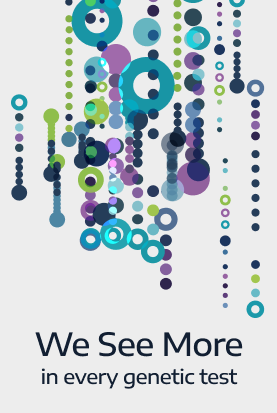Genomic Unity® Custom Analysis
Genomic Unity® Custom Analysis is a diagnostic test designed to identify genetic variants in a custom list of medically-relevant genes.
- Test Description
- When to Order
- Included Analyses
- Turnaround Time
- Sample Types
- CPT Codes
- Methods and Limitations
Test Description
Genomic Unity® Custom Analysis is a targeted test that uses a whole genome platform to detect all major clinically relevant variant types from a single sample. This targeted test focuses on up to 250 genes selected from a list of >4,000 medically-relevant genes.
Genomic Unity® Custom Analysis provides a single, unified clinical report that replaces a battery of tests including: multiplex ligation dependent probe amplification (MLPA) and single gene or targeted gene panel testing. Reflex options replace chromosomal microarray (CMA) and whole exome sequencing (WES).
When to Order
Order this test when clinical symptoms suggest testing for a specific gene or set of genes or clinical features affect multiple body systems.
Included Analyses
- Sequence analysis of selected genes including: single nucleotide variants, deletions, insertions, and characterized intronic variants.
- Copy number variant analysis of selected genes including: duplications/deletions, mobile element insertions, and inversions.
- Short tandem repeat (STR) analysis of the specified gene(s), when relevant.
Optionally includes:
- Reflex to Genomic Unity® Exome Analysis, Genomic Unity® Exome Plus Analysis, or Genomic Unity® Whole Genome Analysis.
Turnaround Time
A report will be issued within 4 weeks from receipt of required samples.
Turnaround time begins when samples and all required documents and approvals are received.
CPT Codes
Varies by gene(s) specified.
The CPT codes provided are for informational purposes only. CPT coding is the sole responsibility of the billing party. Please direct any questions regarding coding to the payer being billed.
Methods and Limitations
Genomic Unity® Custom Analysis uses a PCR-free whole genome sequencing (WGS) platform paired with our Genomic Intelligence® analytical software.
SNVs:
99.9% sensitivity
100% specificity
99.8% positive predictive value
Structural variants:
96% clinical sensitivity
